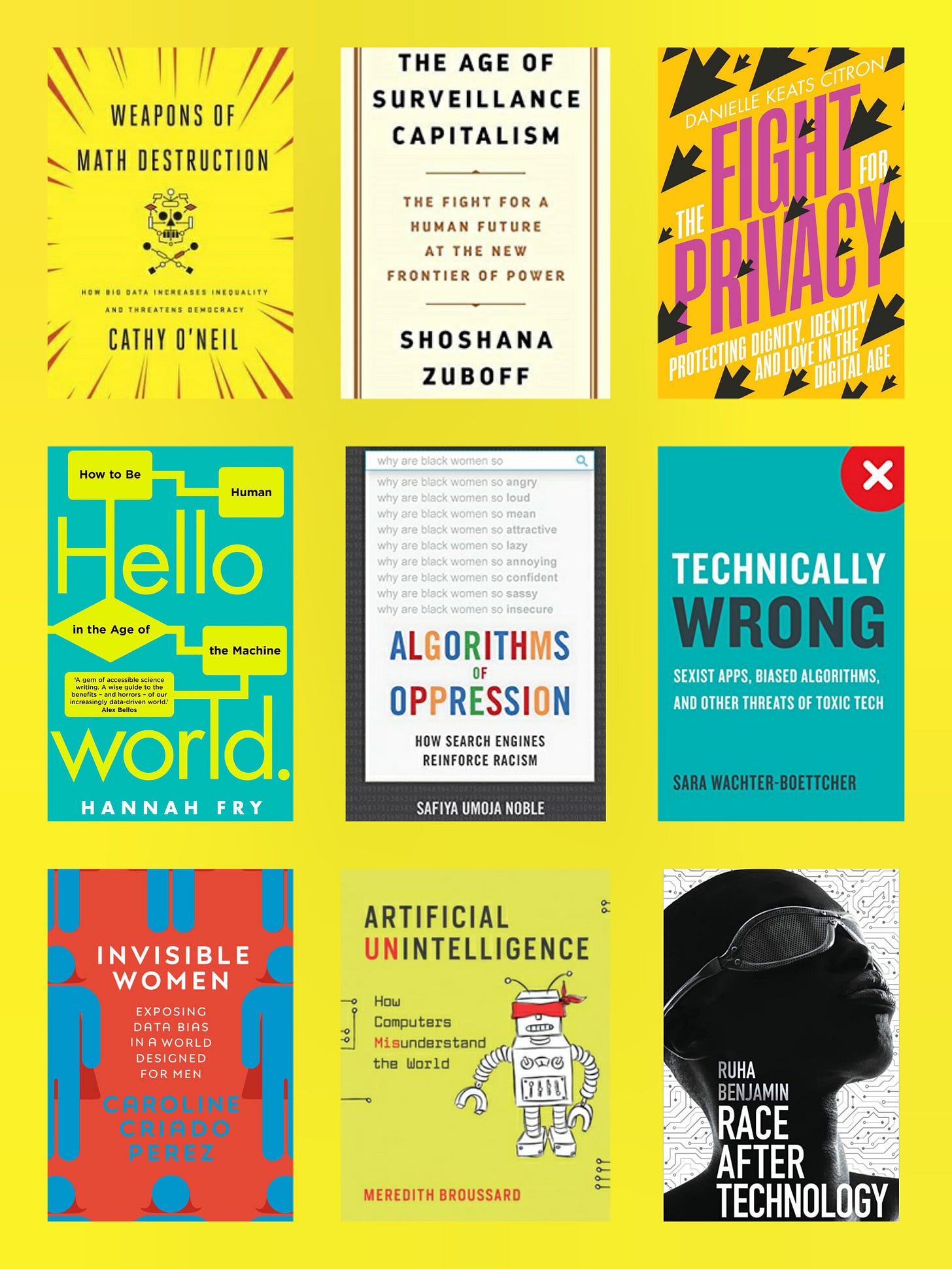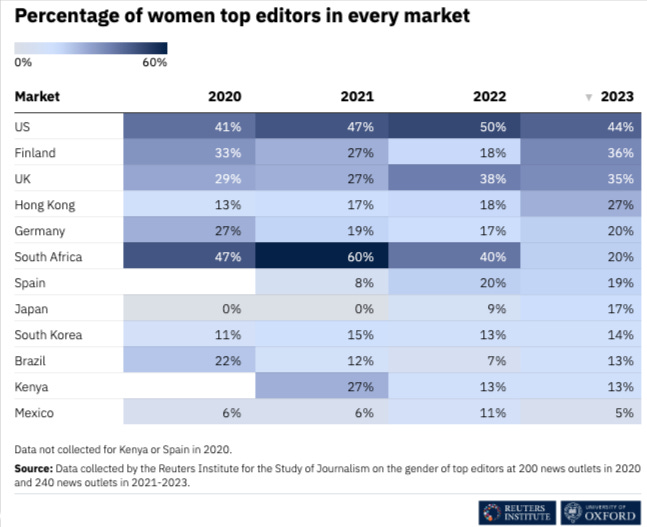The 149th Block: Tech reads for IWD
And the state of social media journalism
This week…
For IWD’s theme ‘DigitALL,’ I put together a list of book recommendations written by women about technology, which I shared on my Instagram story. Here it is if you missed it (text version below):
Weapons of Math Destruction: How Big Data Increases Inequality and Threatens Democracy (2016) by Cathy O’Neil
The Age of Surveillance Capitalism: The Fight for a Human Future at the New Frontier of Power (2018) by Shoshana Zuboff
The Fight for Privacy: Protecting Dignity, Identity, and Love in the Digital Age (2022) by Danielle Keats Citron
Hello World: How to be Human in the Age of the Machine (2018) by Hannah Fry
Algorithms of Oppression: How Search Engines Reinforce Racism (2018) by Safiya Umoja Noble
Technically Wrong: Sexist Apps, Biased Algorithms, and Other Threats of Toxic Tech (2017) by Sara Wachter-Boettcher
Invisible Women: Exposing Data Bias in a World Designed for Men (2019) by Caroline Criado Perez
Artificial Unintelligence: How Computers Misunderstand the World (2018) by Meredith Broussard
Race After Technology: Abolitionist Tools for the New Jim Code (2019) by Ruha Benjamin
Most of the books I’m recommending came out in 2018 and 2019 because it was the period during which I completed my press fellowship at Wolfson College, where I studied misinformation (I have not read as many books as I did since then). The programme director, John Naughton—who himself is an academic and author focusing on the public understanding of technology—said that today’s best critics in tech are women. And you know why? Because in a world designed by men for men, men don’t see the problem they created.
Additionally, I recommend reading the article “The Disappeared: Beyond Winning and Losing” published in Computer in 2018 by Lynn Conway. She is a revolutionary pioneer in computer science and electrical engineering. Among other things, she was behind the design of modern computer chips, which allows us to use our computers today. But it’s okay if you didn’t know that, because IBM fired her when she came out as a trans woman. In this article, she writes:
When “others” (such as women and people of color) make innovative contributions in scientific and technical fields, they often “disappear” from later history and their contributions are ascribed elsewhere. This is seldom deliberate—rather, it’s a result of the accumulation of advantage by those who are expected to innovate. This article chronicles an example of such a disappearance and introduces the Conway Effect to elucidate the disappearance process.
Now, here’s a selection of top stories on my radar, a few personal recommendations, and the chart of the week.
Why should we care about propaganda in communication?
Samuel Woolley for CIGI:
We don’t yet really understand the behavioural effects of online ads. It’s easy to track whether a given ad on social media gets likes or comments, but it is much harder to track its influence on offline behaviours. This is as true for advertising-driven consumption as it is for online political propaganda. Indeed, it is even more difficult to track the behavioural changes from computational propaganda, which is not overt and identifiable political advertising: it includes the covert political propaganda driven by political bots, sockpuppets, gamed “trending now” social media recommendations, and coordinated groups of influencers.
Social media policies are failing journalists
Mark Coddington and Seth Lewis for RQ1:
A new study in Digital Journalism examines this question. Its author, Jacob L. Nelson, conducted in-depth interviews with 37 U.S.-based reporters, editors, publishers, freelancers, and social media/audience engagement managers, covering current and former employees at a wide array of outlets (local and national, for-profit and nonprofit, legacy media and digital media). Interviews focused on journalists’ experiences with and thoughts about their newsroom’s social media policies. Women and journalists of color made up a large share of interviewees because such journalists are more likely to encounter online harassment.
So, what did the journalists interviewed say about the value of social media policies and their organizations’ support mechanisms? The research article’s title provides a hint: “Worse than the Harassment Itself.”
Read on.
On the flaws in the ideological self construction of ‘journalist’ as an identity
A Twitter thread by Aram Zucker-Scharff:

What I read, listen, and watch…
I’m reading about women and leadership in the news media 2023 by Kirsten Eddy et al. at Reuters Institute.
I’m listening to a brief history of Brazilian Portuguese on The Allusionist by Helen Zaltzman. The bulk of my Brazilian Portuguese vocabulary is based on volleyball terminology.
Reviews, opinion pieces, and other stray links:
Influencer parents and the kids who had their childhood made into content by Fortesa Latifi for Teen Vogue.
After the mother tongues by Alexander Jabbari for Aeon.
The hidden cost of telehealth by Jordan Fisher Smith for Open Mind.
Reporting on assistive technology by Amanda Morris for The Open Notebook.
Wired tells readers what it will use generative AI for — and what’s off-limits by Sarah Scire for Nieman Lab.
Chart of the week
From the Reuters Institute report above, the percentage of women in top editorial positions varies significantly across the 12 markets covered. In the US, the figure is down to 44 per cent from 50 per cent last year, while in Finland, the figure has improved from 18 per cent last year to 36 per cent.
And one more thing






Lovely book recommendations, Tina, but that reminded me of something. I noticed that you used to feature a lot more stories from people of colour from outside the western hemisphere, but lately the links you've been sharing come from that 'status quo' group, if you know what I mean. No hate, I just wanted to point that out, in case it's an unconscious thing.
Thanks again for the book suggestions, I've read some and I'm looking forward to getting a hold of the rest.
Lynn Conway is such a legend. Thank you for the spotlight on her.